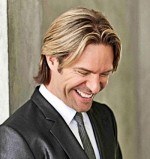Column Name
Title
Subhead
Doctoral candidate Evan Fein recent caught up with alum Eric Whitacre for this special technology issue of the The Journal.
Body
Composer and conductor Eric Whitacre (M.M. ’97, composition) is undoubtedly one of the most successful and prominent figures in classical music today. Known first and foremost for his contributions to choral music, the 43-year-old musician has also created significant works for wind ensemble, orchestra, and more recently for the musical theater stage. His wildly successful and varied career has led him to work with artists and ensembles ranging from the London Symphony Orchestra and the Tallis Scholars to Hans Zimmer and Annie Lennox. His groundbreaking project Virtual Choir—in which performances of a given song by singers around the globe are digitally compiled into an otherwise impossible “super choir”—has more than six million views on YouTube. And the Eric Whitacre Singers won a best choral performance Grammy in 2012 for its debut album. A noted public speaker, Whitacre has shared his ideas with global leaders and innovators through TED talks and an appearance at the World Economic Forum in Davos, Switzerland.
Yet less than two decades ago, Whitacre would doubtless have been the last person to expect such an array of honors. Having grown up in a small town in rural Nevada and taken a healthy seven years to complete his bachelor’s degree at the University of Nevada, Las Vegas, Whitacre had hardly had an auspicious or prodigious start to his musical life when he arrived at Juilliard at the age of 25.
Early on, Whitacre had had a strong but unfocused love of music, dabbling in piano, marching band, and local rock bands. Though he couldn’t read music, he enrolled as a music education major when he began college at 18. Throughout these circuitous early years, it was the unexpected discovery of a love of choral music that propelled him forward. As Whitacre described it in a recent phone conversation with The Journal from London, where he lives with his wife, Hila Plitmann (B.M. ’95, M.M. ’97, voice), and their son. “I joined a choir in the first week of school when I was 18 to meet girls. In the first rehearsal we were singing the Kyrie of Mozart’s Requiem and it was like someone just flipped on a switch inside of me.” After that moment, there was no looking back. By his third year in college, he made his first foray into composition with a choral work dedicated to his choir director. The piece, called Go, Lovely Rose, and the one that followed it, Cloudburst, were very successful and were both published, leaving their author somewhat shocked. “I really just stumbled into it. It kind of became my life without any plan at all.”
Realizing that he might have a shot at a career in music, Whitacre resolved to get a more comprehensive training. However, he wasn’t even sure at first if that would be possible. “I was told by teachers that my grades were so bad, there was no grad school in the country that would accept me,” he said. “So the only school I applied to was Juilliard because it didn’t require a G.P.A., it just required a portfolio.”
He got in, obviously, but his lack of traditional classical training combined with an irrepressible sense of humor and, as he put it, “a juvenile response to authority figures,” Whitacre’s time at Juilliard was less than tranquil. His interest in choral and band music already branded him as an outsider, and his penchant for tonality and lush sonorities, seemingly paradoxically, earned him a reputation as a sort of enfant terrible. Of course he didn’t help matters by presenting a new work called Godzilla Eats Las Vegas at his jury in response to the faculty’s suggestion that he “focus on more serious music.”
Antics aside, however, Juilliard was truly a time of soul-searching for Whitacre. While his pre-existing choral works were off having lives of their own, Whitacre found little institutional support of his music, and certainly didn’t win any of the various prizes the composition department grants annually. His first teacher here was David Diamond, who said of his early work for band Ghost Train (still widely performed today), “Well, it’s effective, but I certainly wouldn’t call it music.” It wasn’t until his second year, when he transferred to John Corigliano’s studio, that he found a strong and encouraging mentor. “He just wanted to talk about the creative process in the abstract, and nobody had ever done that for me,” Whitacre said, noting “the idea of building a piece, its dramatic structure, before you ever write a note is incredibly liberating.” He still creates precompositional graphs of his works, as Corigliano has his students do, and refers to them throughout the compositional process.
Whitacre’s other most formative experience at Juilliard? “Fear-training,” as it was then called colloquially. He described longtime (1964-2013) ear training teacher Mary Anthony Cox (B.M. ’65, M.S. ’67, piano) as “the best teacher I’ve ever had, easily, in any subject. It was the scariest class I’ve ever taken, but she was just the best,” he said. “You develop nerves of steel. I’ve been conducting, and the band starts to go off the rails a little bit, and I can almost feel her hand on my shoulder and everything focuses in.”
In the end, he says going through “the crucible of Juilliard” was an incredibly positive experience, and steeled his resolve and confidence in himself as an artist. He does not teach, but advises younger composers to “follow [their] inner compass. If you love the way something sounds, then it’s right. We often mistake complexity for sophistication, but for me the ultimate expression of sophistication is an elegant idea expressed simply.”





